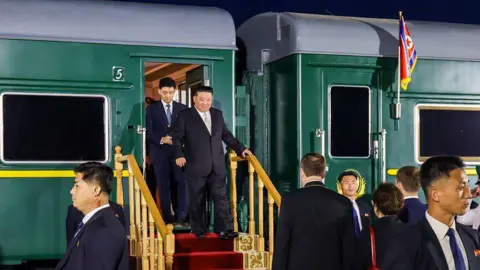North Korean leader Kim Jong Un has left Pyongyang for China, where he will be attending a military parade in the capital Beijing, media reports say.
The 'Victory Day' parade, which takes place on Wednesday, will see Kim rub shoulders with China's President Xi Jinping, Russia's Vladimir Putin, and other world leaders - making it his first multilateral international meeting.
Kim left the North Korean capital on Monday evening onboard his armoured train, said to feature a dining car serving fine French wines and delicacies like fresh lobster. Due to the train's heavy protection, the journey is expected to take up to 24 hours, according to South Korea's Yonhap agency.
This event marks the first time a North Korean leader has attended a Chinese military parade since 1959. Kim will be among 26 other heads of state - including leaders from Myanmar, Iran, and Cuba. His attendance is a notable upgrade from China’s last Victory Day parade in 2015, which was attended by a senior North Korean official, Choe Ryong-hae.
Kim's rare travel abroad, which has generally been limited to meetings with Russian President Putin, reflects a significant step in North Korea's diplomatic outreach. The leader last visited Beijing in 2019 for the commemoration of the 70th anniversary of diplomatic ties, also traveling by train.
The tradition of using the train for international travel was initiated by Kim's grandfather, Kim Il Sung, and continued by his father, Kim Jong Il, who reportedly had a fear of flying. Reports suggest that Kim's armoured train has around 90 carriages, including conference rooms, audience chambers, and sleeping quarters.
During the parade, tens of thousands of military personnel will march through Beijing’s historic Tiananmen Square to mark the 80th anniversary of Japan’s surrender in World War Two. The 70-minute parade is expected to display China’s latest military capabilities, showcasing hundreds of aircraft, tanks, and new anti-drone systems.
Most Western leaders are absent due to tensions following Russia's invasion of Ukraine, which has resulted in sanctions against Putin's regime. Nevertheless, leaders from Indonesia, Malaysia, Myanmar, and Vietnam are expected to be present, reflecting China's efforts to strengthen ties with Southeast Asia. Just one EU leader, Slovak Prime Minister Robert Fico, will be in attendance, alongside representatives from Bulgaria and Hungary.


















